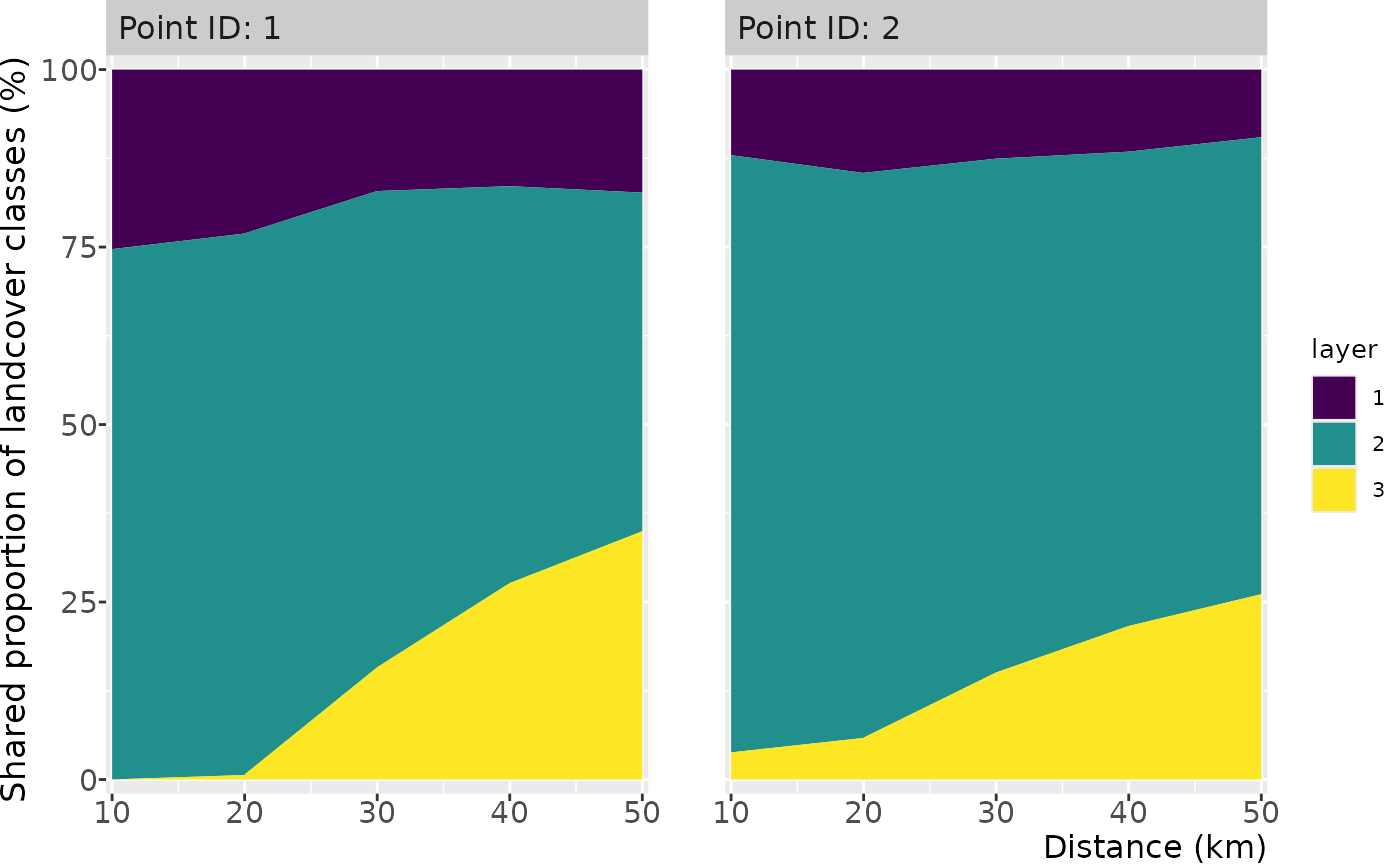Plot the landscape share in subsequential buffers around a/multiple point(s) of interest
Usage
show_shareplot(
landscape,
points,
buffer_width,
max_width = NULL,
multibuffer_df = NULL,
return_df = FALSE
)
show_shareplot(
landscape,
points,
buffer_width,
max_width = NULL,
multibuffer_df = NULL,
return_df = FALSE
)Arguments
- landscape
Raster* object
- points
Point(s) represented by a two-column matrix or data.frame; SpatialPoints*; SpatialPolygons*; SpatialLines; Extent; a numeric vector representing cell numbers; or sf* POINT object
- buffer_width
Buffer widths in which landscape share is measured. By default, it is a vector of buffer sizes, if
max_width = NULL. If a value if provided formax_width, a series of buffer sizes is created, frombuffer_widthtomax_width, with increases ofbuffer_width.- max_width
Max distance to which buffer_width is summed up; the x axis in the plot
- multibuffer_df
data.framewith landscape share or a function from it already extracted, such as through theutil_extract_multibuffer()function. If given, the other arguments (landscape,points,buffer_width,max_width) are ignored. Default is NULL.- return_df
Logical value indicating if a tibble with the underlying data should be returned
Examples
# create single point
new_point = matrix(c(75,75), ncol = 2)
# show landscape and point of interest
show_landscape(classified_landscape, discrete = TRUE) +
ggplot2::geom_point(data = data.frame(x = new_point[,1], y = new_point[,2]),
ggplot2::aes(x = x, y = y),
col = "grey", size = 3)
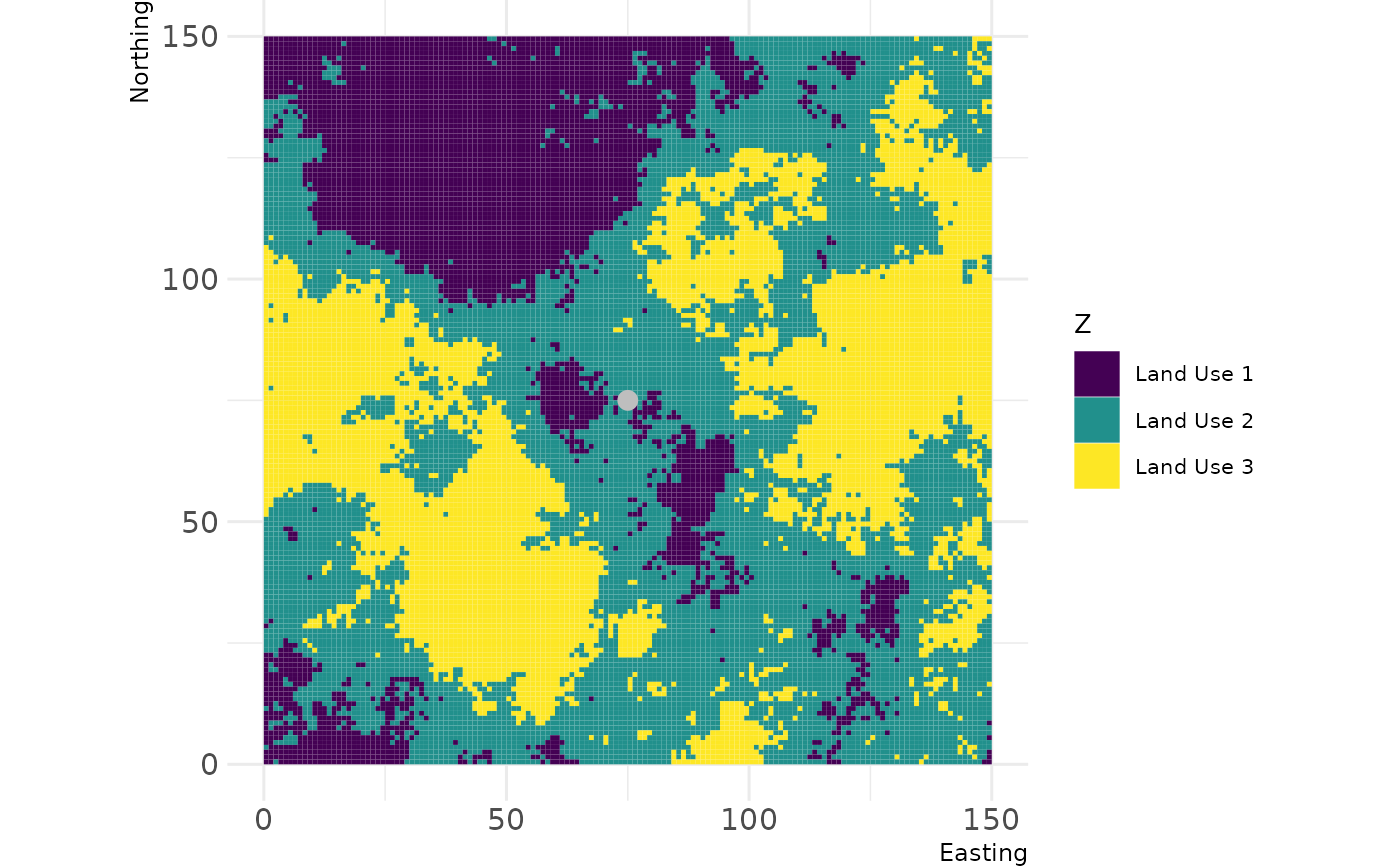 # show single point share
show_shareplot(classified_landscape, new_point, 10, 50)
# show single point share
show_shareplot(classified_landscape, new_point, 10, 50)
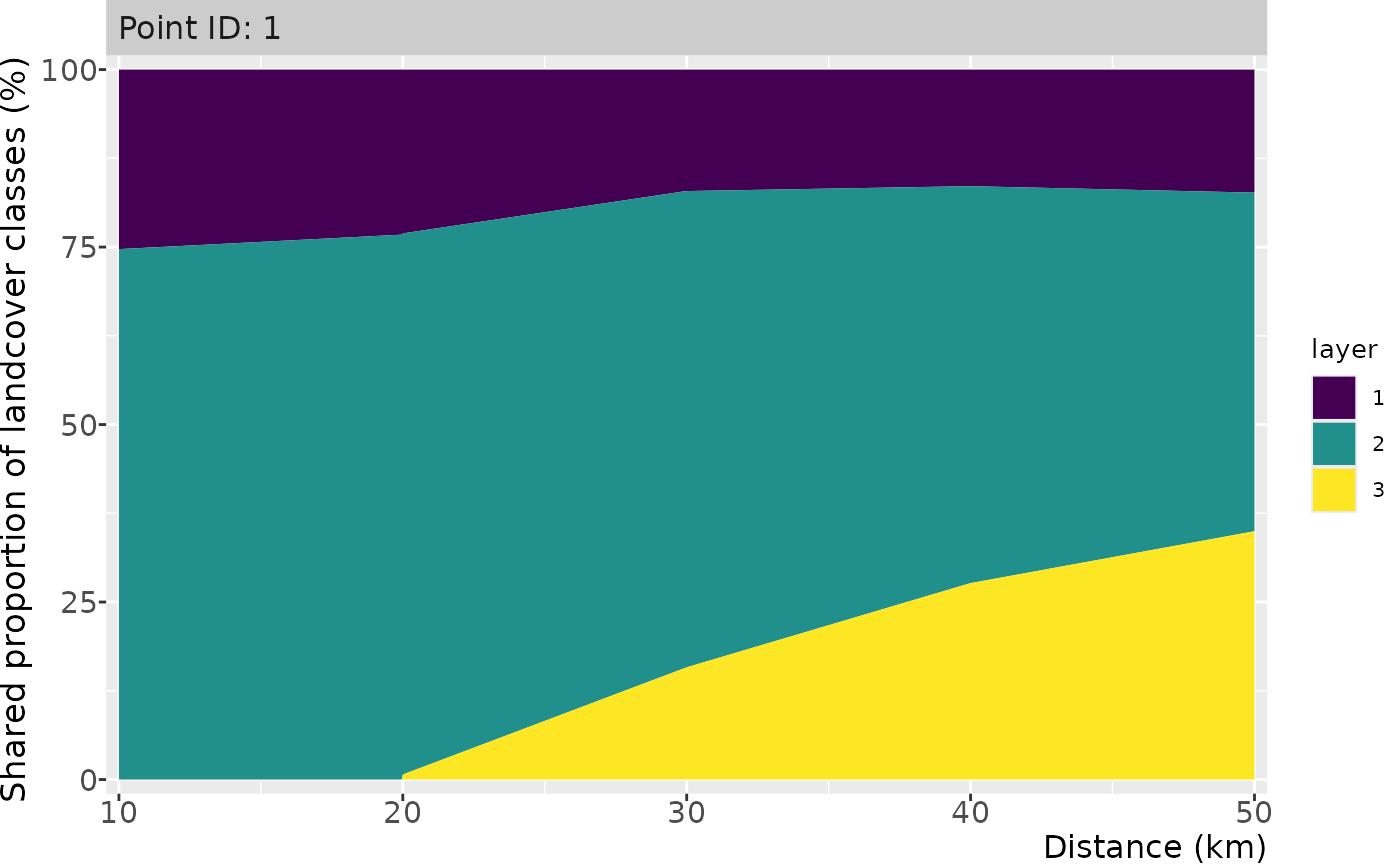 # show multiple points share
new_points = matrix(c(75, 110, 75, 30), ncol = 2)
show_shareplot(classified_landscape, new_points, 10, 50)
# show multiple points share
new_points = matrix(c(75, 110, 75, 30), ncol = 2)
show_shareplot(classified_landscape, new_points, 10, 50)
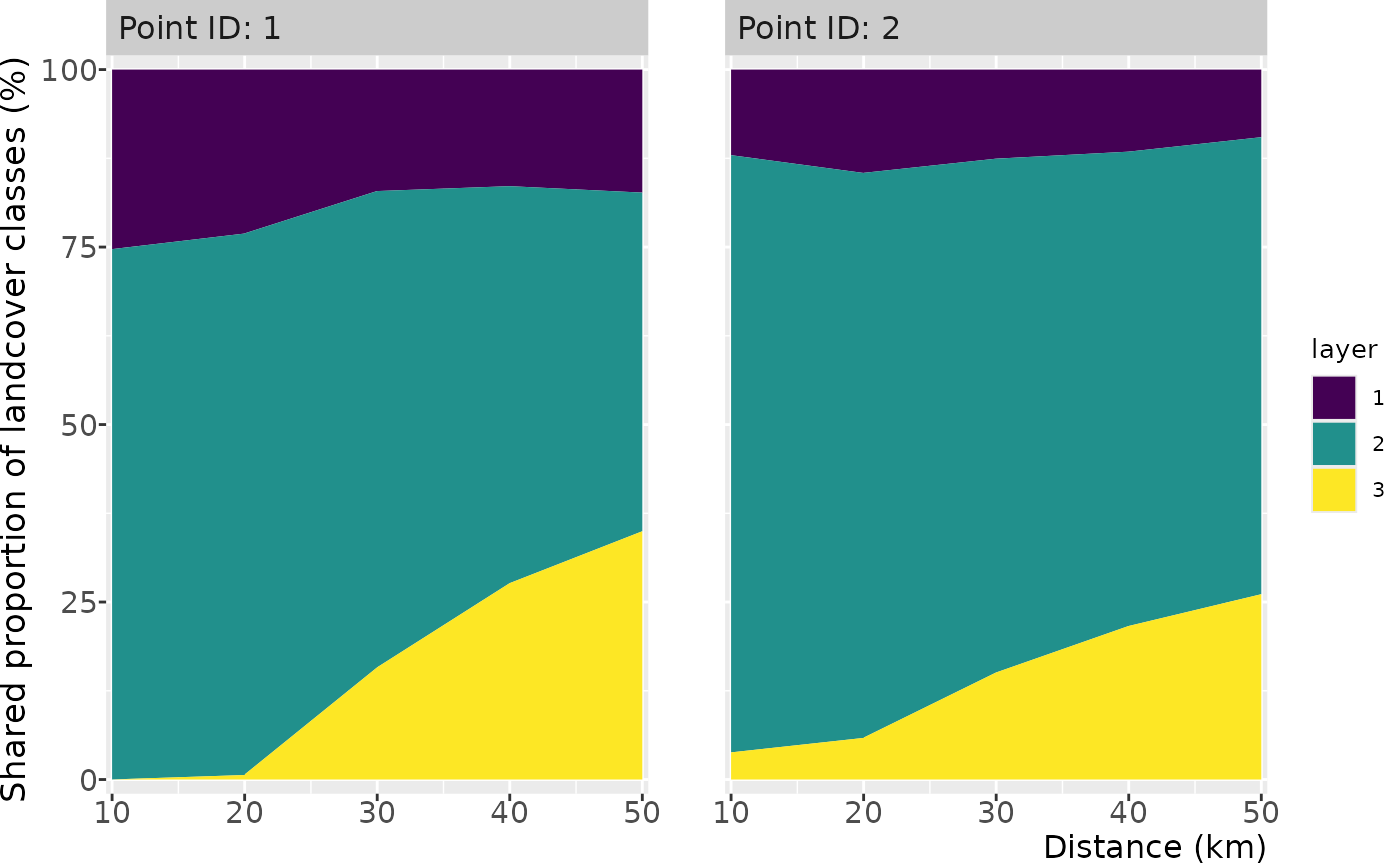 # irregular buffer widths
new_points = matrix(c(75, 110, 75, 30), ncol = 2)
show_shareplot(classified_landscape, new_points, c(10, 30, 50))
# irregular buffer widths
new_points = matrix(c(75, 110, 75, 30), ncol = 2)
show_shareplot(classified_landscape, new_points, c(10, 30, 50))
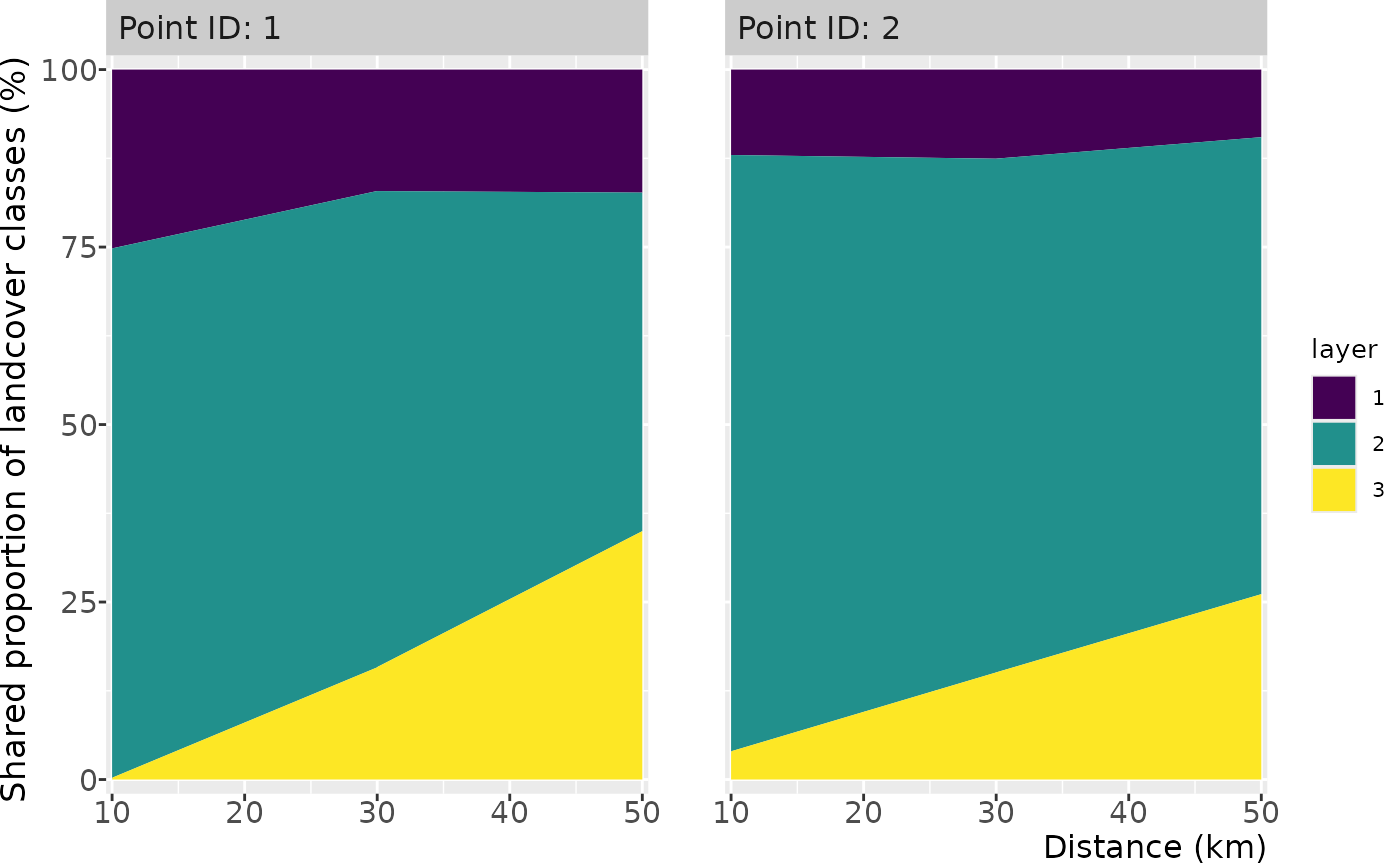 # get data frame with results back
result <- show_shareplot(classified_landscape, new_points, 10, 50, return_df = TRUE)
result$share_df
#> # A tibble: 30 × 4
#> id layer freq buffer
#> <chr> <fct> <int> <dbl>
#> 1 Point ID: 1 1 80 10
#> 2 Point ID: 2 1 38 10
#> 3 Point ID: 1 2 236 10
#> 4 Point ID: 2 2 266 10
#> 5 Point ID: 1 3 0 10
#> 6 Point ID: 2 3 12 10
#> 7 Point ID: 1 1 292 20
#> 8 Point ID: 2 1 184 20
#> 9 Point ID: 1 2 964 20
#> 10 Point ID: 2 2 1006 20
#> # ℹ 20 more rows
# use the output from util_extract_multibuffer
new_points = matrix(c(75, 110, 75, 30), ncol = 2)
df = util_extract_multibuffer(classified_landscape, new_points, 10, 50)
show_shareplot(multibuffer_df = df)
# get data frame with results back
result <- show_shareplot(classified_landscape, new_points, 10, 50, return_df = TRUE)
result$share_df
#> # A tibble: 30 × 4
#> id layer freq buffer
#> <chr> <fct> <int> <dbl>
#> 1 Point ID: 1 1 80 10
#> 2 Point ID: 2 1 38 10
#> 3 Point ID: 1 2 236 10
#> 4 Point ID: 2 2 266 10
#> 5 Point ID: 1 3 0 10
#> 6 Point ID: 2 3 12 10
#> 7 Point ID: 1 1 292 20
#> 8 Point ID: 2 1 184 20
#> 9 Point ID: 1 2 964 20
#> 10 Point ID: 2 2 1006 20
#> # ℹ 20 more rows
# use the output from util_extract_multibuffer
new_points = matrix(c(75, 110, 75, 30), ncol = 2)
df = util_extract_multibuffer(classified_landscape, new_points, 10, 50)
show_shareplot(multibuffer_df = df)
